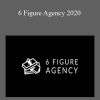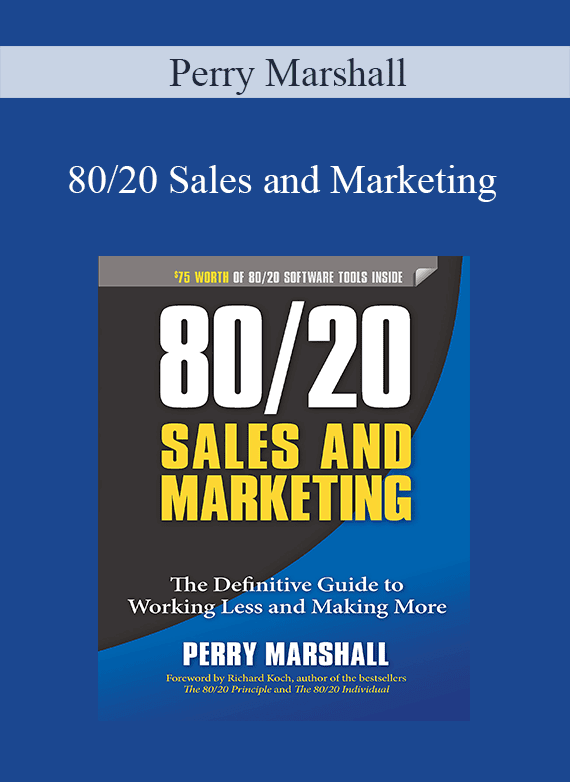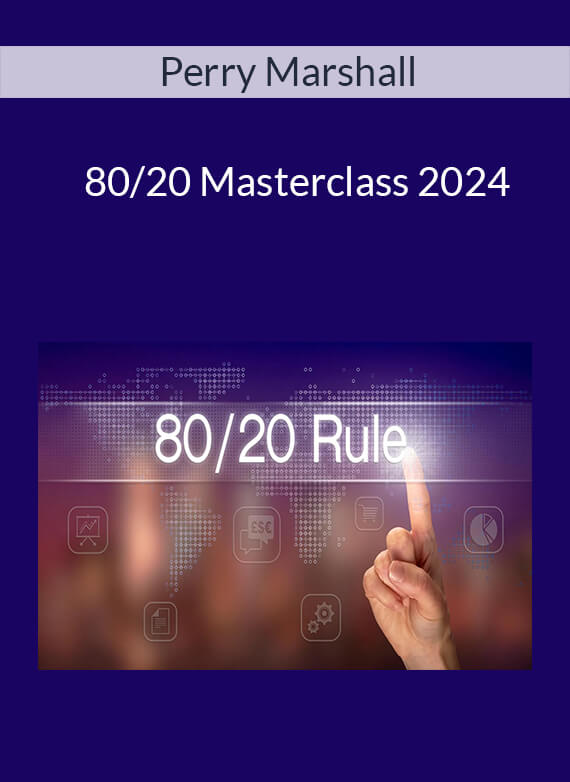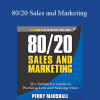Perry Marshall – 80/20 Sales and Marketing: The Definitive Guide to Working Less and Making More
$19.95 Original price was: $19.95.$10.00Current price is: $10.00.
Instant Download: You will receive a download link via your order email immediately
Should you have any questions, please contact us: [email protected]
 Perry Marshall – 80/20 Sales and Marketing: The Definitive Guide to Working Less and Making More
Perry Marshall – 80/20 Sales and Marketing: The Definitive Guide to Working Less and Making More
The 80/20 Rule in Business
80/20 Says 80 Percent of Your Results Come from 20 Percent of Your Efforts, and 20 Percent of Your Results Come from The Other 80 Percent.
80/20 is true of almost anything you can measure in a business:
- Sources of incoming phone calls
- Effectiveness of sales people
- Sales to customers
- Physical location of customers
- Popularity of products
- Types of product defects
- Problem employees
- Customer service problems
- Sources of conflict
- Shoplifters
- Activity patterns in a 24-hour day, or a week or month
- Performance of distributors, affiliates, and channel partners
- Sources of web traffic
- Advertising waste
- Advertising effectiveness
- Productivity of web pages
- Reasons customers buy
BUT… It’s not just true once. It’s true over and over again. 80/202 and 80/203 are just as true, and just as powerful.
What does 80/202 and 80/203 mean? That is where the real power in 80/20 is.
The real power in 80/20 is that you can disregard 80 percent of the roads in your city, only look at the top 20 percent, and the 80/20 rule will still apply. 80 percent of the 80 percent of traffic is on 20 percent of the 20 percent of roads.
That means 64 percent of the travelers drive on 4 percent of the roads. That’s 80/202.
Then we do it again: 80 percent of the 80 percent of the 80 percent of the traffic, runs on 20 percent of the 20 percent of the 20 percent of the roads.
In other words 52 percent of the travelers drive on 0.8 percent of the roads. That’s 80/203.
And it just keeps going because 40 percent of the drivers are driving on 0.2 percent of the roads: 80/204. 32 percent take 0.016 percent of the roads. That’s 80/205.
80/20 says that if you have 10 rooms in your house, you spend almost all your time in two or three of them. It says if you hire 10 sales people, two will generate 80 percent of the sales and the other eight will only generate 20 percent of the sales.
That means that person for person, the two are SIXTEEN TIMES as effective as the eight. That’s right, a good sales person isn’t 50 percent better, he or she is 16X better. That means there’s huge leverage in 80/20; much to be gained if you pay attention, much to lose if you don’t.
80/201 = 16:1
80/202 = 64:1
80/203 = 250:1
80/204 = 1,000:1
80/205 = 4000:1
…and so on.
That means everything in your business is a source of leverage. It means that each has multiple layers of leverage that you can obtain by “zooming in”—80/202 (64:1) and 80/203 (250:1). It means you can combine many of these factors together and cut huge amounts of waste out of your day and your budgets.
If you’re not a math person, stick with me and I’ll make this abundantly clear. This is relatively simple and HUGELY important, because if you want to influence that traffic—say, sell them something by putting up a billboard—you can accomplish as much with one billboard on a major expressway as 1,000 billboards on residential streets. That’s just a simple, elementary example of leverage. As the story unfolds, you’ll discover far more.
You can climb as high as you want, until you run out of roads or customers or products or people. If you have enough numbers to run 80/20 five times, your winners are 4,000 times better than your losers. That’s million-to-one leverage and it’s not a joke. It’s reality.
Here’s a perfect example. Consider the wealth of the entire world—20 percent of the population enjoys 80 percent of the wealth:
According to the International Monetary Fund, the total gross domestic product of all 204 countries in the world in 2011 was $79 trillion (refer to Figure 1-2 ).

Figure 1-2 – This graph shows the productivity of all the world’s countries from least to greatest. Sixty-three percent, or almost $50 trillion of that $79 trillion, comes from just 10 countries. So 63 percent of ALL wealth is generated by 5 percent of the countries.
There are 196 countries in the world and over 63 trillion (80 percent) of those dollars come from just 22 countries. So, as shown in Figure 1-3 (page 00), 80 percent of the world’s wealth is concentrated in just 9 percent (196 countries divided by 22) of the countries:

Figure 1-3 – 80 percent of the world’s wealth is concentrated in 22 countries.

Figure 1-4 – Zooming in, we see that $15 trillion, or 19 percent of the total $79 trillion, comes from one country, the United States. So 19 percent of world wealth is generated by 0.5 percent of the countries. (World Economic Outlook Database, October 2012, International Monetary Fund. Accessed on October 10, 2012. Graphics by Lorena Ybarra.)
I want you to notice how the shape of the curve is the same, whether we’re looking at the whole picture (Figure 1-3), or just the top 20 percent (Figure 1-4), or just the top 4 percent. As we move forward, that curve is going to become very useful to you.
Now consider the top 10 wealthiest people in the world. I took this from the Forbes 400 list, from Forbes magazine 2011. I lumped members of families together (all the Waltons are lumped together, for example):
- Wal-Mart – Four Walton Children: $87B
- Microsoft – Gates & Ballmer $72.9B
- Koch Brothers – Charles & David $50B
- Berkshire Hathaway – Warren Buffett $39B
- Google – Sergey Brin & Larry Page $33.4B
- Soros Fund Mgt – George Soros $22B
- Las Vegas Sands – Sheldon Adelson $21.5B
- Bloomberg – Michael Bloomberg $19.5B
- Amazon – Jeff Bezos $19.1B
- Facebook – Mark Zuckerberg $17.5B
The total is 381.9 billion, and the top three own 55 percent of it.
80/20 is true of the world’s seven billion people—and it’s still pretty much true of the top 10 wealthiest people. The 80/20 pattern is exactly the same whether we’re looking at the world’s seven billion people, the Forbes 400 or the 10 richest people in the world.
As we dive into this material, I’ll give you a software tool that makes eerily accurate predictions and “see around the corner” in ways that will mystify your friends and colleagues.
Proof Content
Sale Page: https://www.perrymarshall.com/80-20/
Archive: https://archive.ph/wip/GJUQB
Delivery Method
– After your purchase, you’ll see a View your orders link which goes to the Downloads page. Here, you can download all the files associated with your order.
– Downloads are available once your payment is confirmed, we’ll also send you a download notification email separate from any transaction notification emails you receive from imcourse.digital.
– Since it is a digital copy, our suggestion is to download and save it to your hard drive. In case the link is broken for any reason, please contact us and we will resend the new download link.
– If you cannot find the download link, please don’t worry about that. We will update and notify you as soon as possible at 8:00 AM – 8:00 PM (UTC+8).
Thank You For Shopping With Us!
Be the first to review “Perry Marshall – 80/20 Sales and Marketing: The Definitive Guide to Working Less and Making More” Cancel reply
Related Products
Business & Sales
Internet Marketing
Business & Sales








Reviews
There are no reviews yet.